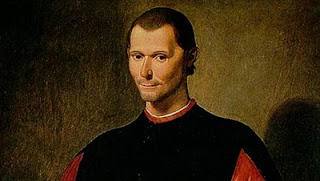Niccolo Machiavelli (1469-1527) Italian philosopher, best known for his still popular book The Prince.
My political ideologies class today reminded me of a few good ideas that came from the Italian philosopher Niccolo Machiavelli. While Machiavelli's best known work, The Prince, outlines how to take and keep political power, including the use of brute force to maintain power, he also gave us some important ideals of self-government.
In Machiavelli's Discourses (c. 1517) he criticized princely rule, with its attendant use of brute force, and advocated a system of popular rule by virtuous and vigilant citizens whose ideal was to protect the liberty of all. From his (and other) philosophers we've inherited the ideal of republicanism - the rule over the many by the few. Because we, in the US, also grew up with the democratic ideal, our particular republic is also a democracy, based on the will and vote of the individual citizens.
What struck me in class today was Machiavelli's warning about self government, speaking to us from 500 years ago. The greatest danger to self government, according to Machiavelli, is corruption - the tendency of those in power to turn away from protecting the interests of the citizens and turning toward self interest, especially economic self interest. (Economic self interest is usually called greed. What we've come to term "corporate greed" is only a drop in the bucket compared with government greed.)
Self government, Machiavelli says, is not for the lazy, the selfish, or the corrupt but reserved only for a citizenship who prefers self discipline, a love of national interests, a basic amount of civic virtue, and a respect for the law. Only a government based on the rule of law and not of selfish men can protect the freedom of its citizens.
Much of what I've previously written over the years points to an increasing disregard for Machiavelli's warning concerning self government. As our government becomes more steeped in corruption, we see that bit by bit, the freedoms of the individual is taken away in preference for government power and a false sense of security. (When government has all the power, who will secure us from our own government? Obama? The Democrats? The Republicans?)
The ideal of self government is at stake in our upcoming election: not the argument over whether Republicans or Democrats are in power; not the disappointment over national health care "reform"; not the poor rulings of district court judges; not the problem of illegal aliens; not the overspending of money; not the poor decisions and waste of lives in Iraq and Afghanistan; not even a self centered president who cannot understand the American mind, let alone guide it.
All of these examples exist as merely symptoms of government corruption and its self-interest in maintaining power. All are a danger, in one form or another, of overpowering the democratic ideal of self government and undermining the Republic, just as Machiavelli warned half a millennium ago.
Our task, of course, is a difficult one. We, as American citizens, can no longer be lazy in self government, taking the easy road of ignorance of power. As Benjamin Franklin anecdotally said a mere 220 years ago, we have "a Republic, if you can keep it." Without the constant reform and return to the democratic ideal, our Republic is in danger. And, as Machiavelli warned, without the will of self government, brute force may yet prevail.

0 comments:
Post a Comment